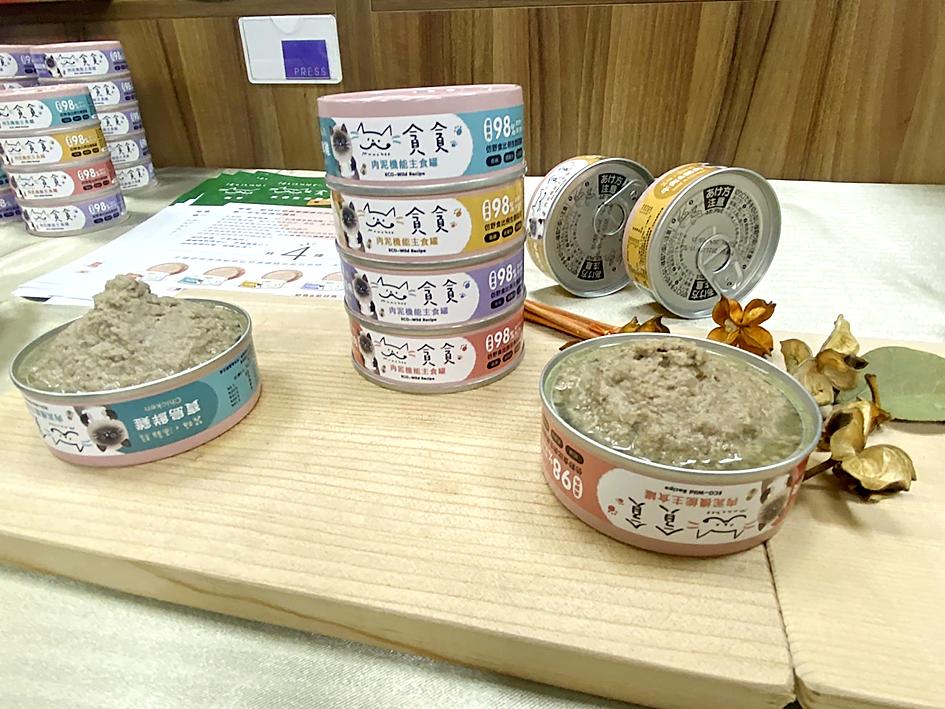A Miaoli County-based agricultural research agency has created a technique for making canned cat food from silkworm pupae, which helps prevent the growth of harmful intestinal bacteria and reportedly eliminates the smell of cat feces.
The Council of Agriculture’s Miaoli District Agricultural Research and Extension Station unveiled the results at a news conference on Wednesday, citing a report by the Taiwan Institute of Economic Research that there were about 1 million pet cats in the nation last year.
Taiwan’s first canned cat food made from silkworm pupae was developed using domesticated silkworm, Bombyx mori, which has an innate immune system that produces antimicrobial peptides — a group of immune proteins that protect the host from infection — during the cocoon phase, station director Lu Hsiu-ying (呂秀英) said.

Photo: CNA
Silkworm pupae are a good source of protein because they contain crude protein, crude lipids, carbohydrates and chitin, she said, adding that they also have high levels of essential amino acids and are rich in omega-3 alpha-linolenic acid.
More than 70 percent of cat owners said they would consider feeding their pet the silkworm pupae, the agricultural research station said, citing a survey of cat owners.
Some owners in trials reported that after eating the new cat food their pet’s feces was less smelly, their fur more luxuriant and they had a bigger appetite, the station said.
The method for making the cat food has been transferred to a biotechnology company for mass production, it said.

CAUTION: Based on intelligence from the nation’s security agencies, MOFA has cautioned Taiwanese travelers about heightened safety risks in China-friendly countries The Ministry of Foreign Affairs (MOFA) yesterday urged Taiwanese to be aware of their safety when traveling abroad, especially in countries that are friendly to China. China in June last year issued 22 guidelines that allow its courts to try in absentia and sentence to death so-called “diehard” Taiwanese independence activists, even though Chinese courts have no jurisdiction in Taiwan. Late last month, a senior Chinese official gave closed-door instructions to state security units to implement the guidelines in countries friendly to China, a government memo and a senior Taiwan security official said, based on information gathered by Taiwan’s intelligence agency. The

The National Immigration Agency (NIA) said yesterday that it will revoke the dependent-based residence permit of a Chinese social media influencer who reportedly “openly advocated for [China’s] unification through military force” with Taiwan. The Chinese national, identified by her surname Liu (劉), will have her residence permit revoked in accordance with Article 14 of the “Measures for the permission of family- based residence, long-term residence and settlement of people from the Mainland Area in the Taiwan Area,” the NIA said in a news release. The agency explained it received reports that Liu made “unifying Taiwan through military force” statements on her online

Taiwan Semiconductor Manufacturing Co (TSMC), the world’s largest contract chipmaker, said yesterday that it is looking to hire 8,000 people this year, at a time when the tech giant is expanding production capacity to maintain its lead over competitors. To attract talent, TSMC would launch a large-scale recruitment campaign on campuses across Taiwan, where a newly recruited engineer with a master’s degree could expect to receive an average salary of NT$2.2 million (US$60,912), which is much higher than the 2023 national average of NT$709,000 for those in the same category, according to government statistics. TSMC, which accounted for more than 60 percent

Tung Tzu-hsien (童子賢), a Taiwanese businessman and deputy convener of the nation’s National Climate Change Committee, said yesterday that “electrical power is national power” and nuclear energy is “very important to Taiwan.” Tung made the remarks, suggesting that his views do not align with the country’s current official policy of phasing out nuclear energy, at a forum organized by the Taiwan People’s Party titled “Challenges and Prospects of Taiwan’s AI Industry and Energy Policy.” “Taiwan is currently pursuing industries with high added- value and is developing vigorously, and this all requires electricity,” said the chairman